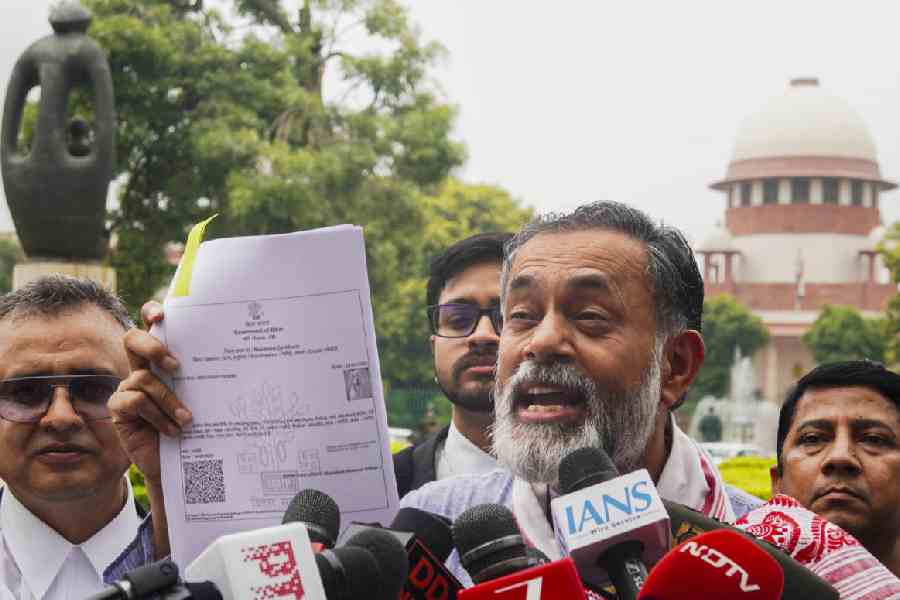The Supreme Court on Tuesday said Aadhaar could not be accepted as conclusive proof of citizenship during the special intensive revision of electoral rolls, an exercise whose alleged arbitrariness was demonstrated by political activist Yogendra Yadav who produced two voters presumed dead by the Election Commission.
Yadav’s action evoked a sharp response from senior counsel Rakesh Dwivedi, appearing for the poll panel. “Why is this drama being enacted in the court?” he said.
A bench of Justices Surya Kant and Joymalya Bagchi was hearing a batch of pleas challenging the validity of the SIR in poll-bound Bihar. At the fag end of the hearing,
Yadav presented before the court two senior citizens who were allegedly excluded from the Bihar draft rolls on the ground of death.
Of the 65 lakh voters who were deleted from the draft rolls, 22 lakh have been declared dead.
“Lordships may see them (two senior citizens). These persons are declared dead. Their names don’t appear in the draft rolls. But they are alive. Please see them,” Yadav told the bench.
“There may be some inadvertent error. It can be corrected. But your points are well taken,” Justice Bagchi responded.
The top court agreed with the EC’s decision not to accept Aadhaar and voter card as conclusive proof of citizenship and said they had to be supported by other documents. “The law relating to granting or taking away citizenship has to be passed by Parliament, but the inclusion and exclusion of citizens and non-citizens from the rolls is within ECI remit,” Justice Kant observed.
Senior advocate Abhishek Manu Singhvi, appearing for the petitioners, said voters whose names already figured in previous electoral rolls should not be subjected to a fresh scrutiny.
Justice Kant asked Singhvi to refer to Section 9 of the Aadhaar (Targeted Delivery of Financial and Other Subsidies, Benefits and Services) Act, 2016. It states that “Aadhaar number or the authentication thereof shall not, by itself, confer any right of, or be proof of, citizenship or domicile in respect of an Aadhaar number holder”.
“The Election Commission is correct in saying that Aadhaar can’t be accepted as conclusive proof of citizenship. It has to be verified,” the bench remarked.
“Presumptively, citizenship cannot be doubted for 5 crore people. Many have voted in different elections, and now there is a presumption that they are not included. You have presumptively declared 5 crore as invalid,” Singhvi argued.
The court said it would intervene in case of a large-scale exclusion of voters.
Singhvi submitted that the previous voters’ list had been invalidated solely on the ground of citizenship.
“You cannot have a system where citizenship is doubted for 5 crore people,” he argued.
The bench pointed out that those included on the voters’ list of 2003 and their children need not submit any proof of citizenship.
Senior advocate Kapil Sibal, appearing for somepetitioners, submitted that many voters in Bihar did not have the documents sought by the EC, prompting Justice Kant to remark: “Bihar is part of India. If Bihar does not have, other states also won’t. There should be some documents like... any identity card/ document issued by the local authorities/ LIC must be there.”
“It is a very sweeping argument that in Bihar, nobody possesses these documents. Aadhaar and ration card they must be having…?” he added.
Sibal argued that Aadhaar and ration cards were not being accepted.
“These documents would bona fide show you are a resident of that area. The initial burden shifts from you to them (EC). Then they haveto verify if your card is genuine. Give them documentsand let them verify,” the bench said.
“They (EC) are right in saying they can’t be accepted as conclusive proof. Under notification, what’s the procedure provided when you submit these documents?” it added.
Justice Bagchi said the intensive revision process was aimed at identifying deceased voters and excluding them from the rolls.
Advocate Prashant Bhushan, appearing for the Association for Democratic Reforms, said the EC did not provide the actual reason behind the deletion of 65 lakh voters.
EC counsel Dwivedi said Bhushan was misleading the court as the details had been provided to political parties by booth-level officers.
Bhushan said the EC had removed the search feature in draft rolls. “They are saying you go and ask agents of recognised political parties. Why should I ask? Why should I, as an elector of Bihar, have to go to a political party?” Bhushan argued.
Justice Kant agreed with Bhushan: “Voters have a right. Those who claim to be bona fide citizens would have a right to know,” he said.
The arguments will continue on Wednesday.











